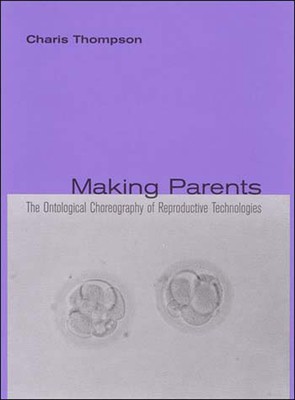
- We will send in 10–14 business days.
- Author: Charis Thompson
- Publisher: MIT Press
- ISBN-10: 0262701197
- ISBN-13: 9780262701198
- Format: 13.8 x 22.4 x 2.1 cm, softcover
- Language: English
- SAVE -10% with code: EXTRA
Reviews
Description
Assisted reproductive technology (ART) makes babies and parents at once. Drawing on science and technology studies, feminist theory, and historical and ethnographic analyses of ART clinics, Charis Thompson explores the intertwining of biological reproduction with the personal, political, and technological meanings of reproduction. She analyzes the ontological choreography at ART clinics--the dynamics by which technical, scientific, kinship, gender, emotional, legal, political, financial, and other matters are coordinated--using ethnographic data to address questions usually treated in the abstract. Reproductive technologies, says Thompson, are part of the increasing tendency to turn social problems into biomedical questions and can be used as a lens through which to see the resulting changes in the relations between science and society.
After giving an account of the book's disciplinary roots in science and technology studies and in feminist scholarship on reproduction, Thompson comes to the ethnographic heart of her study. She develops her concept of ontological choreography by examining ART's normalization of miraculous technology (including the etiquette of technological sex); gender identity in the assigned roles of mother and father and the conservative nature of gender relations in the clinic; the naturalization of technologically assisted kinship and procreative intent; and patients' pursuit of agency through objectification and technology. Finally, Thompson explores the economies of reproductive technologies, concluding with a speculative and polemical look at the biomedical mode of reproduction as a predictor of future relations between science and society.
EXTRA 10 % discount with code: EXTRA
The promotion ends in 17d.17:22:55
The discount code is valid when purchasing from 10 €. Discounts do not stack.
- Author: Charis Thompson
- Publisher: MIT Press
- ISBN-10: 0262701197
- ISBN-13: 9780262701198
- Format: 13.8 x 22.4 x 2.1 cm, softcover
- Language: English English
Assisted reproductive technology (ART) makes babies and parents at once. Drawing on science and technology studies, feminist theory, and historical and ethnographic analyses of ART clinics, Charis Thompson explores the intertwining of biological reproduction with the personal, political, and technological meanings of reproduction. She analyzes the ontological choreography at ART clinics--the dynamics by which technical, scientific, kinship, gender, emotional, legal, political, financial, and other matters are coordinated--using ethnographic data to address questions usually treated in the abstract. Reproductive technologies, says Thompson, are part of the increasing tendency to turn social problems into biomedical questions and can be used as a lens through which to see the resulting changes in the relations between science and society.
After giving an account of the book's disciplinary roots in science and technology studies and in feminist scholarship on reproduction, Thompson comes to the ethnographic heart of her study. She develops her concept of ontological choreography by examining ART's normalization of miraculous technology (including the etiquette of technological sex); gender identity in the assigned roles of mother and father and the conservative nature of gender relations in the clinic; the naturalization of technologically assisted kinship and procreative intent; and patients' pursuit of agency through objectification and technology. Finally, Thompson explores the economies of reproductive technologies, concluding with a speculative and polemical look at the biomedical mode of reproduction as a predictor of future relations between science and society.


Reviews